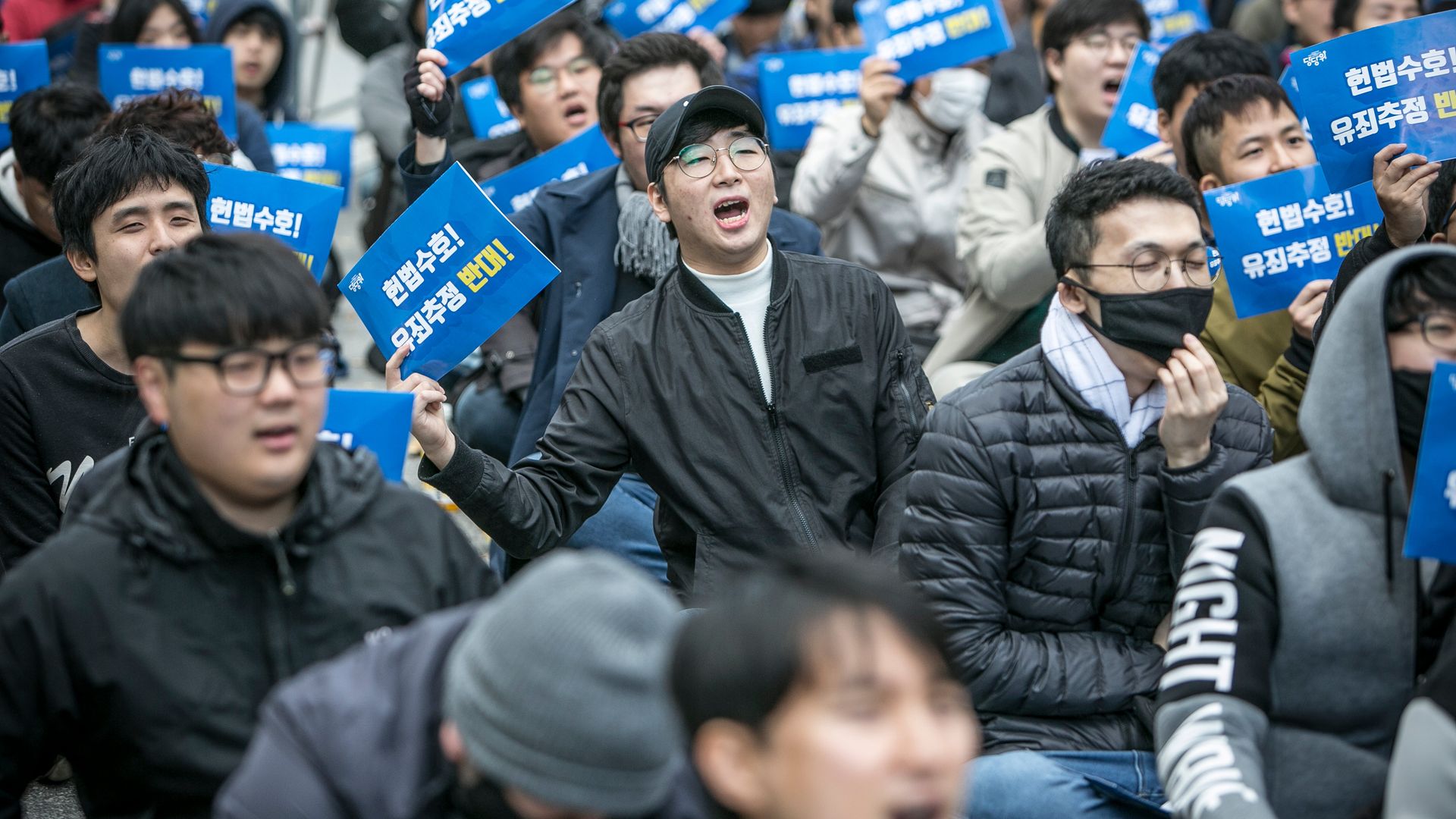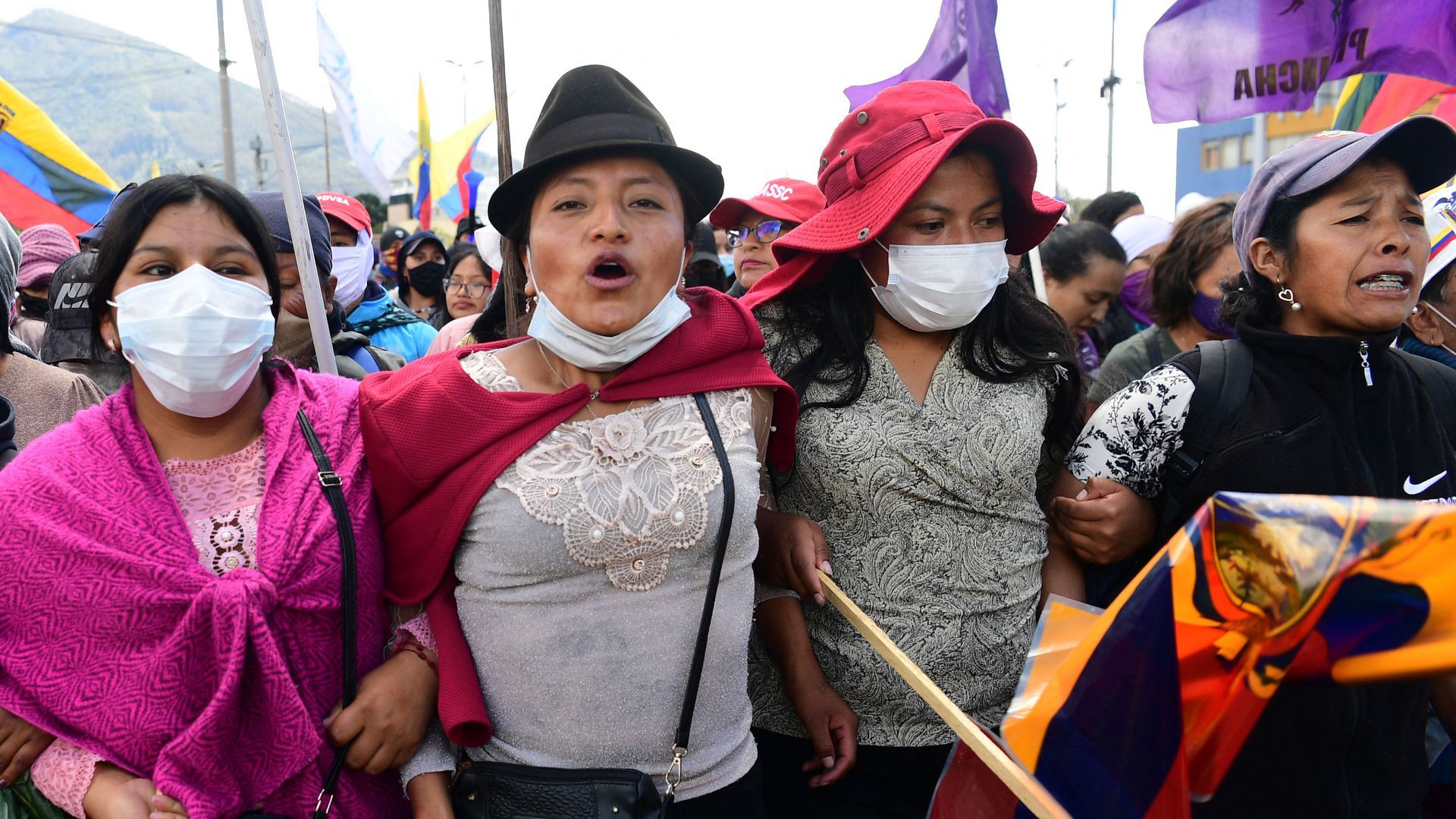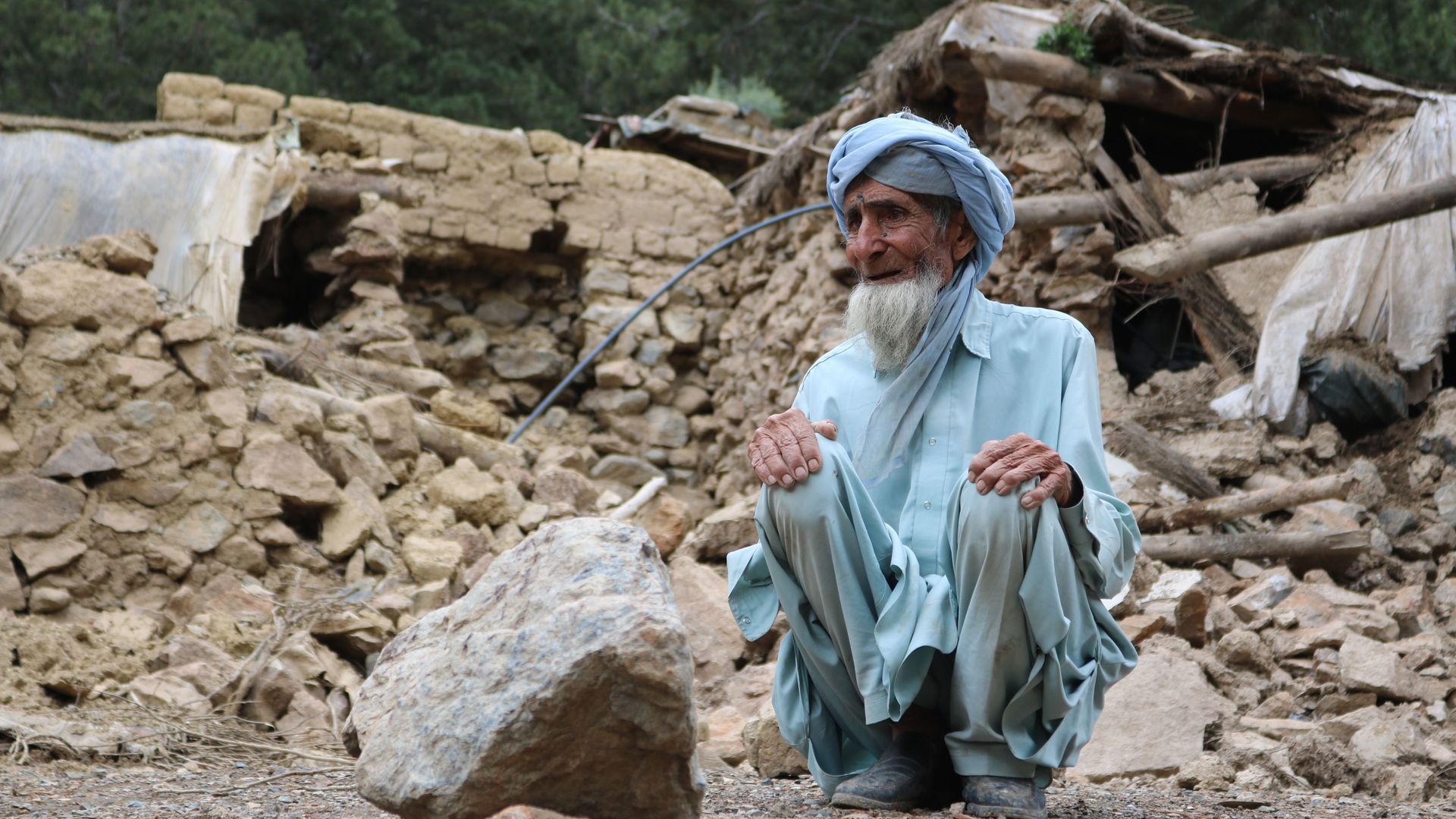| | | | | | | Presented By Gallup | | | | Axios World | | By Dave Lawler · Jun 23, 2022 | | Good morning from Seoul. - I'm here on a fellowship organized by the Atlantic Council and Korea Foundation. We've been meeting this week with senior officials, business executives and foreign policy experts, many of whom spoke to us on the condition of anonymity to offer their candid views.
- It's an interesting time to be here: President Yoon Suk-yeol took office just six weeks ago, and he's now preparing for a likely North Korean nuclear test. That's where tonight's edition (1,848 words, 7 minutes) begins.
New arrival? Subscribe. | | | | | | 1 big thing: U.S. and South Korea wait for bad news from the North |  | | | Watching coverage of a 2017 North Korean missile launch from a Seoul train station. Photo: Chung Sung-Jun/Getty Images | | | | SEOUL, South Korea — Officials and experts in Washington and Seoul agree that North Korea is set to conduct its seventh nuclear test and its first since 2017 — likely quite soon. The big picture: Kim Jong-un's regime continues to develop its nuclear arsenal and rebuff offers from both the U.S. and South Korea for dialogue or COVID aid. - Neither ally is prepared to offer unilateral concessions to break the deadlock. That's effectively rendered them bystanders, waiting for bad news.
In response to the rising threat, South Korea's hawkish new President Yoon Suk-yeol is focusing on strengthening Seoul's defenses and its alliance with the U.S. - "The seventh nuclear test is most likely. Our response will be very tough and hard, and that will heighten tensions on the Korean Peninsula," says Moon Chung-in, chair of the Sejong Institute think tank.
- Moon says the U.S. and South Korea have little leverage to prevent a test and almost nothing left to sanction in response, leaving steps like joint military exercises and the deployment of additional U.S. military assets in the region.
- "North Korea will respond in kind," says Moon, who served as a top adviser to Yoon's predecessor. The test for leaders in Washington and Seoul will be to break out of that cycle, he says, but that won't be easy.
The backstory: Former President Moon Jae-in repeatedly pursued diplomacy with Kim but ultimately failed — along with former President Donald Trump — to secure any significant progress on the nuclear issue. - Now, both Yoon and President Biden appear pessimistic about reaching any nuclear agreement.
- "The Yoon government is open to dialogue with North Korea, but that does not mean that we're hurrying up to make a breakthrough," an adviser who worked on Yoon's campaign says. "We will be patient."
- A ruling party lawmaker notes that both carrots and sticks were tried over the previous five years and "nothing worked."
Between the lines: The current limbo isn't entirely new. North Korea has combined diplomatic silence with nuclear provocations before, including during the "fire and fury" period that preceded the Trump-era summits. - But Pyongyang has already conducted a record number of missile tests this year and further alarmed South Korea by announcing the pursuit of tactical nuclear weapons, which could lower the threshold for a nuclear strike.
- A recent poll by the Chicago Council on Global Affairs found that 71% of South Koreans now support developing nuclear weapons domestically, rather than relying on the American nuclear umbrella. That won't happen anytime soon, but the poll reflects the sense of insecurity within the population.
The other side: Some experts in Seoul think Kim felt burned or even deceived by the U.S. after his summits with Trump yielded no sanctions relief. - The U.S. will likely have to take the lead if there's to be a breakthrough, a senior South Korean opposition lawmaker says, because Kim's appointments and rhetoric suggest he's emphasizing his dealings with Washington over Seoul.
- Thus far, Biden has not prioritized North Korea or offered much beyond a standing offer for talks with no preconditions.
- Meanwhile, China vetoed additional North Korea sanctions at the UN earlier this month and appears unlikely to join forces with the U.S. to ratchet up the pressure on its nuclear-armed neighbor.
What to watch: The North Korean regime may eventually return to the negotiating table, perhaps when it feels threatened or believes it has the upper hand. - But even if those talks do begin, few in Seoul will expect them to end with Kim surrendering his nuclear arsenal.
|     | | | | | | 2. What South Korea's power transfer means for China and Japan |  | | | Japanese Foreign Minister Yoshimasa Hayashi (right) delivers a letter from Prime Minister Fumio Kishida to South Korean President Yoon Suk-yeol. Photo: Chung Sung-Jun/Getty Images | | | | For the first time on record, polls suggest Koreans now feel more unfavorably toward China than they do toward Japan, a fellow U.S. ally and the country's former colonial ruler. Why it matters: Yoon has sent early signals that he intends to mend relations with Japan and take a more critical approach to China — just what the Biden administration wants to hear. But for historical reasons in Japan's case and trade considerations in China's, both shifts will be difficult to execute. South Koreans' backlash against China has been driven by Beijing's response to Seoul's deployment of a U.S. missile defense system in 2017 — which included unofficial bans on K-pop acts, TV shows and a variety of products. - Yes, but: While China's trade practices and growing geopolitical assertiveness are a source of considerable unease, even Yoon's allies don't think he can afford to pick fights with a regional giant that accounts for one-quarter of South Korea's trade.
- That helps explain why Yoon is talking about putting the U.S.-Korea alliance at the core of his foreign policy, while maintaining a relationship of "mutual respect" with China.
Between the lines: Yoon's desire to improve relations with Japan is genuine, "but will go slower than expected because we need a consensus within Korea, not just between Korea and Japan," the foreign policy adviser to Yoon's campaign says. - Both of Korea's major parties have used tensions with Japan to their political advantage in the past, notes the lawmaker from the conservative ruling party. Yoon will have to move cautiously to avoid exposing himself to criticism, he says.
- Still, prospects of warmer relations seem far more realistic under Yoon and Japanese Prime Minister Fumio Kishida than under their predecessors, Moon Jae-in and Shinzo Abe, whose contentious relationship caused several headaches for Washington.
What to watch: Even if the leaders of America's two East Asian allies see eye to eye, animosity among the general public — inflamed in recent years by rulings about colonial-era sexual slavery and forced labor — remains a potent political force. |     | | | | | | 3. Gender divide between young people shakes South Korean politics |  | | | An anti-feminism protest in Seoul in October 2021. Photo: Jean Chung/Getty Images | | | | Yoon's election in March by just 0.7% of the vote highlighted the sharp divisions in Korean society between generations, income levels and, perhaps most starkly, between genders. Breaking it down: Yoon benefited from deep discontent among young men, winning 59% of men in their 20s vs. just 34% of women in that age group — by far the largest gender gap in any age group. - During the campaign, Yoon said feminism was warping relationships between men and women, claimed men were being treated like "potential sex criminals," and denied the existence of systemic discrimination against women.
- He was appealing to the anti-feminist backlash among young men in South Korea that has been driven at least in part by fierce competition for jobs and university places.
The big picture: South Korea has one of the world's most-educated populations, but as the country's once-explosive economic growth has slowed, many have been left unemployed or underemployed. - While gender inequality in the South Korean economy has historically been unusually high for a rich country, more women than men are now attending college, and the most prestigious employers are hiring many more women than before.
- The fact that men are required to serve around two years in the military, while women aren't, has become a potent political issue.
Yes, but: Women are also facing the same cutthroat career competition in a system that's still largely run by men. - South Korea has the lowest birth rate in the world, due in part to career pressures and the high cost of child care.
What they're saying: Politicians from both parties contend that the primary driver of the tension is economics. - "If you get down to the root cause of the problems among the younger generation, when they have a lack of opportunities to be successful, they have to fight against each other," says the opposition lawmaker.
- The generation that's currently in power in politics and business enjoyed all the fruits of South Korea's democratic and economic development, the ruling party member added, while younger people today risk being left behind.
|     | | | | | | A message from Gallup | | Employee stress reaches an all-time high globally | | |  | | | | Gallup surveys thousands of employees in over 140 countries annually. In 2021, we found the world's workers are: - stressed
- disengaged
- not thriving in well-being
Looking ahead: The "State of the Global Workplace: 2022 Report" shows data by region with advice for leaders on how to improve trends. | | | | | | 4. Data du jour: Confidence in Biden slips among allies |  Data: Pew Research Center; Chart: Jacque Schrag/Axios Confidence in Biden appears to be waning among some of America's closest allies. By the numbers: A new Pew poll of 17 countries, most of them U.S. allies in Europe and Asia, finds that confidence in Biden to "do the right thing regarding world affairs" fell everywhere but South Korea between 2021 and 2022. - The survey authors cite the chaotic U.S. exit from Afghanistan, which just 33% of those polled think was handled well, as one likely factor.
- Trust in Biden (median of 60%) across the 17 countries is on par with French President Emmanuel Macron (62%) and German Chancellor Olaf Scholz (59%), and far ahead of Chinese President Xi Jinping (18%) and Russian President Vladimir Putin (a record-low 9%).
- Biden also far exceeds Trump. He didn't top 25% in any of the 12 countries polled in 2020.
Poll methodology. |     | | | | | | 5. Global news roundup |  | | | Indigenous women protest against the government in Quito on June 23. Photo: Martin Bernetti/AFP via Getty Images | | | | 1. Ecuador's government yesterday rejected Indigenous protesters' conditions for dialogue as demonstrations continued to rock several cities, including the capital Quito, AP reports. - Driving the news: Protests, some of which have turned violent, began more than 10 days ago over fuel and food shortages, as well as government policies.
2. EU leaders today granted candidate status to Ukraine and Moldova — the first step in what could be a long process toward full EU membership, Axios' Ivana Saric reports. 3. Nearly 8 million children under the age of 5 in 15 crisis-hit countries, including Afghanistan, South Sudan and Yemen, are at risk of death from severe malnutrition, the UN children's agency warned today. 4. The Israeli government's collapse will force President Biden to navigate a sensitive balancing act during his upcoming visit to Israel, which will take place three months before early elections, Axios Tel Aviv's Barak Ravid reports. - The intrigue: Acting Prime Minister Yair Lapid, not Naftali Bennett, will greet Biden at the airport when he arrives next month.
5. Last weekend's election of leftist Gustavo Petro as Colombia's next president could change the course of the country's relationship with the United States, Axios Latino co-author Marina Franco writes. |     | | | | | | 6. Afghanistan, already reeling, hit with another crisis |  | | | An elder reacts to the earthquake's devastation in Khost province, where hundreds of homes were destroyed. Photo: Sardar Shafaq/Anadolu Agency via Getty Images | | | | Yesterday's massive earthquake that officials say killed more than 1,000 people in southeastern Afghanistan rocked a country already struggling with deepening economic, hunger and other crises, Axios' Laurin-Whitney Gottbrath writes. Driving the news: The withdrawal of U.S. troops and Taliban takeover last August helped plunge the country into a "catastrophic" humanitarian crisis made worse by Russia's war in Ukraine, a collapsing economy and protracted drought. State of play: Nearly 20 million people — almost half the country's population — were facing acute hunger at the beginning of last month, according to a UN-backed report. What they're saying: Taliban officials, survivors of the quake and the UN have called on the international community to help in the rescue and recovery efforts. - "We count on the international community to help support the hundreds of families hit by this latest disaster," UN Secretary-General António Guterres said in a statement. "Now is the time for solidarity."
- One Afghan survivor told AP: "We are with nothing and have nothing, not even a tent to live in."
Go deeper: Afghans dig by hand after deadly quake |     | | | | | | 7. Stories we're watching |  | | | Preparing to jump into the river to escape a heat wave in Basra, Iraq. Photo: Hussein Faleh/AFP via Getty | | | - Heat waves shatter records on 2 continents
- Zelensky: Fight for key Donbas cities reaching "fearsome climax"
- Iran dismisses IRGC intel chief amid suspicious deaths of Iranian officers
- U.S. working on normalization "road map" for Saudi Arabia, Israel
- 3 summits offer test of Western unity
- Damning report exposes rampant corruption in South Africa
- Kaliningrad is a flash point in East-West relations — again
Quoted: "You are ruining Turkey's reputation. The leader of the Republic of Turkey will embrace the man who ordered the killing." — Turkish opposition leader Kemal Kılıçdaroğlu to President Recep Tayyip Erdoğan, who welcomed Saudi Crown Prince Mohammed bin Salman to Ankara on Wednesday for the first time since journalist Jamal Khashoggi was murdered in the Saudi Consulate in Istanbul. |     | | | | | | A message from Gallup | | How employees in over 140 countries are doing | | |  | | | | The employee voice should be at the center of decision making as leaders look to the future. From well-being and engagement, to the job market and the best regions to work, you can find the collective voice of the world's employees in the "State of the Global Workplace: 2022 Report." Get the report. | | |  | It's called Smart Brevity®. Over 200 orgs use it — in a tool called Axios HQ — to drive productivity with clearer workplace communications. | | | | | | Axios thanks our partners for supporting our newsletters. If you're interested in advertising, learn more here.
Sponsorship has no influence on editorial content. Axios, 3100 Clarendon Blvd, Suite 1300, Arlington VA 22201 | | | You received this email because you signed up for newsletters from Axios.
Change your preferences or unsubscribe here. | | | Was this email forwarded to you?
Sign up now to get Axios in your inbox. | | | | Follow Axios on social media:    | | | | | |











No comments:
Post a Comment